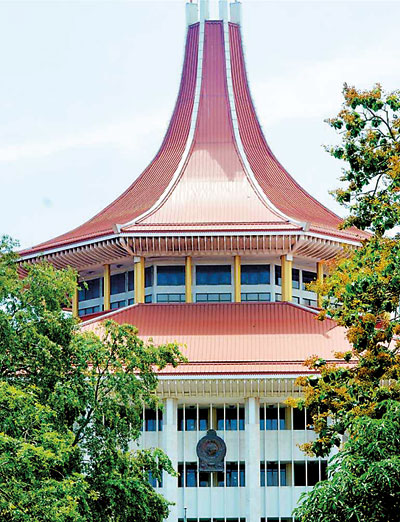Tuesday Feb 17, 2026
Tuesday Feb 17, 2026
Wednesday, 23 February 2022 05:12 - - {{hitsCtrl.values.hits}}
By Chandani Kirinde
 The Supreme Court has determined that several notable clauses in the Special Goods and Services Tax (GST) Bill are inconsistent with the Constitution, a ruling which is likely to kill the Bill.
The Supreme Court has determined that several notable clauses in the Special Goods and Services Tax (GST) Bill are inconsistent with the Constitution, a ruling which is likely to kill the Bill.
The SC determination was announced to the House by Speaker Mahinda Yapa Abeywardena last morning. The SC Bench comprised Justices Vijith K. Malalgoda PC, Murdu N.B. Fernando PC and Yasantha Kodagoda PC.
The constitutionality of the Bill, aimed at simplifying the country’s existing tax structure was challenged by nine petitioners before the SC in terms of Article 121 (1) of the Constitution.
The SC’s determination is likely to kill the Bill as the court refrained from suggesting amendments to the clauses determined as inconsistent with the Constitution as it routinely does when Bills are placed before it for special determination stating it would be “impracticable” to do so in this case.
The three-member SC Bench said suggesting clause specific amendments in keeping with its determination would “fundamentally alter the basic nature and structure of the Bill” and become inconsistent with its declared objectives.
The court said it is exercising discretion conferred on it by the Constitution by refraining from determining the manner in which the relevant clauses could be amended so as to alter them to become consistent with the Constitution.
The proposed Bill gives authority to the Finance Minister to make an Order on the rate of the special GST applicable, either ad valorem or specific, to the respective specified goods or services which comes into immediate effect once an Order is published in the Gazette. Parliamentary approval is required only within three months after such an order is made.
The court stated that under the Constitution, Parliament exercises fuII control of Public Finance and this is a constitutional duty is required to be discharged by Parliament on behalf of the people.
Thus, by empowering the Minister in the manner provided in Clauses 2 and 3 of the proposed Special GST Bill, Parliament distinctively and manifestly loses control over public finance and unconstitutionally alienates such power to the Minister.
The court also shot down the clause in the Bill which proposes the setting up of a separate account under a Designated Officer from the Treasury where the monies collected as the Special GST tax are to be maintained.
“In contrast with the monies in the Consolidated Fund, as regards the monies in the afore-stated separate fund, the Parliament has not retained for itself any such control over withdrawals from the account,” the SC stated, adding that the inbuilt safeguards pertaining to the withdrawal of monies from the Consolidated Fund are not found with regard to this proposed fund.
“Thus, it is seen that the Parliament is to deprive itself of the constitutional responsibility to ensure that tax revenue is utilised only for public purposes and for other purposes approved by Parliament. This is another manifestation of Parliament losing control over public finance,” the court said in its determination.
The court also ruled that the appeal process available to a person aggrieved by the imposition of the proposed tax was “draconian in nature, oppressive and would render the conferred right of appeal virtually nugatory”.
The court was of the view that any “statutory or other mechanism that would obstruct, restrict or inhibit such access to the judicial system or render access nugatory or futile, would thereby obstruct the course of justice and would tantamount to an infringement of Article 4 (c) read with Article 3 of the Constitution”.
The court held that in terms of Article 123(2)(c) of the Constitution, the Special Goods and Services Bill requires to be passed as required by Article 84(2) of the Constitution, by not less than two-thirds of the whole number of Members of Parliament (including those not present) voting in favour thereof and approved by the People at a Referendum by virtue of the provisions of Article 83 of the Constitution.
